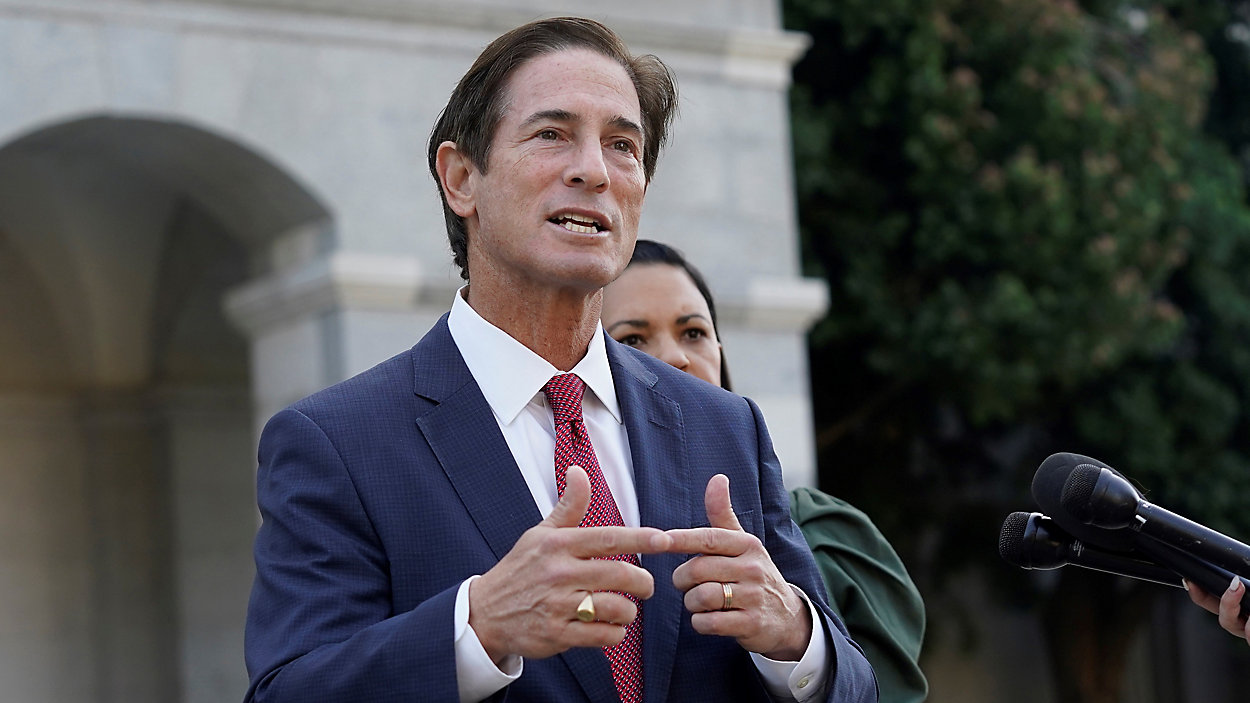Trump’s designation of “Antifa” as a domestic terrorist organization marks the beginning of a new era in American politics. It will reshape the power structure, the state, and society much as the “War on Terror” refashioned the global order and expanded the surveillance state.
For Carl Schmitt, the essence of the political is the definition of friend and enemy. In the opening lines of The Concept of the Political he writes: “The concept of the state presupposes the concept of the political.” If the concept of the political precedes the concept of the state, then the definition of friend and enemy is a precondition for the state.
Trump attempted to designate “Antifa” as a domestic terrorist organization for the first time in May 2020 in the wake of the Black Lives Matter movement. But that threat came to nothing. There is no equivalent to the foreign terrorist law that allows the executive to designate domestic groups as terrorists—yet—so the designation would have been merely symbolic.
Five years later, that attempt has come to fruition. There is still no law that gives the “domestic terrorist organization” label legal weight. Yet, by replacing “foreign” with “domestic,” it is implied that the same measures once used to fight the former will now be applied to the latter.
This seems to be the case following Trump’s executive order, which states that not only “all relevant executive departments and agencies” should work to stop any activity of this alleged organization but also of “any person claiming to act on behalf of Antifa or Antifa provided material support.”
Since the 2010 Holder v. Humanitarian Law Project case, “material support” has been redefined to include non-material support, such as non-violent speech or “hate speech.” This redefinition came through the implementation of the Patriot Act, which criminalizes support for “foreign terrorist organizations.” Now this could be deployed to criminalize dissent against the government by labeling it “Antifa support.”
The assassination of Charlie Kirk has been used by the Trump administration to justify a wave of repression and censorship, employing rhetoric that mirrors what the MAGA movement once accused Democrats and the broader “cancel culture” of using. Their aim, as with the suspension of Jimmy Kimmel’s show, is to silence any opposition to the current administration while a major restructuring of power is happening.
The Trump administration is conducting structural changes in the American power system that is supposed to be a constitutional republic. On the one hand, it is extending the power of the executive to basically become legislative, through the use of executive orders, and on the other, it is pressuring the judiciary to become compliant with the executive.
This is illustrated by the persecution of pro-Palestinian dissent and migrants, and the many cases in which legislation has come from the executive, its implementation overseen by it, and the judiciary convinced or pressured to comply. The militarization of Washington is another example of how this administration is concentrating power in the presidency by foregoing any checks and balances that remained.
Economically, Trump is favoring monopolization in the hands of a small elite, as in the case of David Ellison, son of Oracle’s founder, taking over Paramount and CBS and preparing a bid for Warner. His father has recently become the richest man on earth, according to Bloomberg, due to an increase in the stock price of Oracle due to AI’s needs for servers. Larry, together with Sam Altman, was also part of the “Stargate” $500 billion investment announced by Trump and is set to be part of the new U.S. TikTok ownership.
The ongoing restructuring of power will effectively create an openly authoritarian regime with power and wealth concentrated in the hands of a few. One may argue that it was already the case, and it wouldn’t be wrong. The U.S. oligarchy and aristocracy have been the subject of several books and hundreds of articles. However, I believe there is a critical difference in what is coming.
In the outgoing structure, there was a degree of separation of powers—not so much among the executive, legislative, and judiciary branches, which constitutionally should have been the case, but rather between industrial, political, and financial power. Often intertwined, these spheres also had differing interests, which exercised their influence in the state.
That is changing. The new digital oligarchs claiming their role in the upper echelons of society and power have unleashed a restructuring of the power architecture. The new one will merge the political, the digital, and, eventually, the financial, into a single governing body.
This is what I believe constitutes a new model for the U.S., which is already in place elsewhere. In China, the party-state controls key stakes in the three spheres: political, digital/industrial, and financial. Arguably, this has given them the chance to direct resources and legislation in order to advance the interests of the state. Some (see, for example, Alex Karp’s The Technological Republic) consider this the reason why the U.S. has been left behind, why its hegemony is ending.
The rise of a new economic elite, as is the case with the digital oligarchs and their interests and ideas, such as Alex Karp, Peter Thiel, Musk o Altman, is the substance of many, if not most, revolutions—for example, the French one. In Phantom Terror: The Threat of Revolution and the Repression of Liberty, 1789–1848, historian Adam Zamoyski analyzes with painful detail, attending to primary sources, how this revolution and the European counter-revolution shaped the modern state and society.
Zamoyski shows that the belief in an omnipresent revolutionary underground movement led to paranoia across European elites, where even minor protests, liberal clubs, or student associations were treated as evidence of a vast Jacobin plot. That is what Zamoyski calls “phantom terror.”
It’s not that there was no danger, but that the danger was vastly overplayed, and sometimes even imagined, by the ruling elites. This phantom terror, he shows, produced a system of surveillance, censorship, and authoritarian control that defined European politics and society and that ultimately, led to the very outcomes that sought to prevent.
Through censorship, surveillance, and authoritarian control, the nation-state was centralized and consolidated. It was the threat, imagined and real, that fueled the transition. The current Western system of compulsory education, which originated in the Austrian Empire and was shaped by revolution and counter-revolution, remains a lasting example of how the ideas and policies of that era continue today.
The designation of Al-Qaeda as the enemy in the post-9/11 “War on Terror” conjured a similar “phantom terror.” It is usually agreed that at the time Al-Qaeda was not an organization with a clear structure and chain of command capable of deploying resources with precision and controlling a large number of operatives. Some, like Adam Curtis in The Power of Nightmares, argue that it did not even exist—that it was the name of a U.S. “mujahideen” database.
The abstraction of the enemy in the “War on Terror” had several consequences. The first is that, as in counter-revolutionary Europe, many plots were exaggerated and some even conjured up. This led to a paranoid state in which mass surveillance and control were justified. Presumption of innocence and the right to a fair trial, cornerstones of social order, were thrown out the window, as for example with the Patriot Act in the U.S. and similar legislation in Europe.
The economic consequences of this were aptly summed up in the term “surveillance capitalism,” by which a whole new economy—in many ways the precursor to the current digital economy—exploded. We did not only become subjects of state control, but the tools developed for that purpose also made us corporate products through our data.
The abstraction of the enemy also made it impossible for a regular army to fight it. Hence the disasters of Iraq and Afghanistan and the loss of millions of lives. These failures precipitated the emergence of that which it was trying to eliminate: an organization with a clear structure, command, and resources embodied in ISIS.
There is nothing more powerful to strengthen cohesion and create a social form than a clear enemy. For the loose network of “terrorists,” the U.S. became exactly that. Arguably, that was also one of the reasons for the War on Terror, as theorized by a handful of neoconservatives thinking about how to maintain U.S. power in the century ahead.
After an initial post-9/11 success in creating a sense of unity, the energy dissipated into questioning the actual goals of the U.S. administration while conducting this war. This continued to the extent that today, the former FOX anchor Tucker Carlson is conducting a documentary questioning the official narrative around 9/11.
However, it is now too late. 9/11, whichever the story one wants to believe, gave rise to the global phenomenon of terrorism that—at times used by state intelligences everywhere and at times independent—has been instrumental in shaping our current law, economy, and politics. Designating “Antifa” as a terrorist organization has a similar transformative potential for the U.S. that perhaps could spread to other nations too.
Antifa is not truly an organization but rather a label used to loosely describe a set of ideas and unsystematic actions, or adopted by individuals to construct an identity for themselves. It’s as abstract as Al-Qaeda was, or perhaps even more. That is exactly what the Trump administration needs.
In order to usher in the new model of society, as theorized by the new digital oligarchs who are disrupting the previous power structure, there needs to be broad reforms in the relationship between state and individuals. For one, the digitalized and algorithmic state structure they propose, as illustrated by Musk’s “DOGE,” needs total access to personal information so that individuals become models for the state-run AI project.
But the effect of designating “Antifa” as a terrorist organization goes further—to the very core of identity. Psychologists in the 1970s proposed the “Social Identity Theory.” In order to develop an identity, the theory goes, a person needs to identify with a group and see that group in opposition to other groups. The group with which one identifies is attributed positive qualities—absorbed as part of one’s own identity—while the opposing group is assigned negative traits.
This theory of identity building, though partial, goes to the core of politics as understood by Carl Schmitt. Group identities become the basis upon which to construct the political narrative of enemy and friend. And upon it, the state. Antifa is the new enemy of the state that could allow for the transformation of the power structure and the emergence of a new digital state.


























